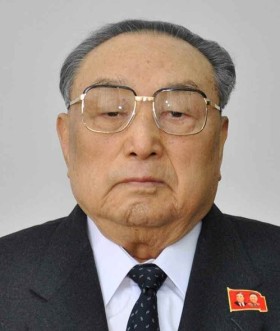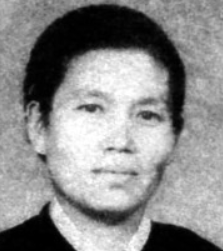| |||||
| Centuries: | |||||
|---|---|---|---|---|---|
| Decades: | |||||
| See also: | Other events in 1983 Years in North Korea Timeline of Korean history 1983 in South Korea | ||||
Events from the year 1983 in North Korea .
| |||||
| Centuries: | |||||
|---|---|---|---|---|---|
| Decades: | |||||
| See also: | Other events in 1983 Years in North Korea Timeline of Korean history 1983 in South Korea | ||||
Events from the year 1983 in North Korea .

Kim Jong Il was a North Korean politician who was the second supreme leader of North Korea. He led North Korea from the death of his father Kim Il Sung in 1994 until his death in 2011, when he was succeeded by his son, Kim Jong Un. Afterwards, Kim Jong Il was declared Eternal General Secretary of the Workers' Party of Korea (WPK).
Kim Jong Chul, sometimes spelled Kim Jong Chol, is a son of former North Korean Supreme Leader Kim Jong Il. His younger brother is current Supreme Leader Kim Jong Un. His older half-brother Kim Jong-nam was assassinated in February 2017.

The premier of North Korea, officially the premier of the Cabinet of the Democratic People's Republic of Korea, is the head of government of North Korea and leader of the North Korean Cabinet.

The Socialist Constitution of the Democratic People's Republic of Korea is the constitution of North Korea. It was approved by the 6th Supreme People's Assembly at its first session on 27 December 1972, and has been amended and supplemented in 1998, 2009, 2012, 2013, 2016, 2019 (twice), 2023 and 2024. It replaced the country's first constitution which was approved in 1948.

Kim Jong Un is a North Korean politician who has been supreme leader of North Korea since December 2011 and the general secretary of the Workers' Party of Korea (WPK) since 2012. He is the third son of Kim Jong Il, who was the second supreme leader of North Korea, and a grandson of Kim Il Sung, the founder and first supreme leader of the country.

The eternal leaders of North Korea are mentions of deceased leaders of North Korea. The phrase was mentioned in a line of the preamble to the Constitution, as amended on 30 June 2016, and in subsequent revisions.

The Commander-in-Chief of the Armed Forces of Democratic People's Republic of Korea is the commander-in-chief of the Korean People's Army, the military of North Korea. The office was established on 4 July 1950 and abolished with the passing of a new constitution in 1972. Since then, the office of President of North Korea, the Chairman of the National Defence Commission and the President of the State Affairs Commission have been referred to as supreme commanders in accordance with the constitution.

The Workers' Party of Korea (WPK), also called the Korean Workers' Party (KWP), is the sole ruling party of the Democratic People's Republic of Korea, commonly known as North Korea. Founded in 1949 from a merger between the Workers' Party of North Korea and the Workers' Party of South Korea, the WPK is the oldest active party in Korea. It also controls the Korean People's Army, North Korea's armed forces. The WPK is the largest party represented in the Supreme People's Assembly and coexists with two other legal parties that are completely subservient to the WPK and must accept the WPK's "leading role" as a condition of their existence. The WPK is banned in the Republic of Korea under the National Security Act and is sanctioned by the United Nations, the European Union, Australia, and the United States.

The supreme leader of North Korea is the de facto hereditary leadership of the Workers' Party of Korea, the state and the Korean People's Army. Each individual North Korean leader have assumed different offices and positions, and different titles were used in North Korean propaganda that could be translated from Korean as "Great Leader", "Dear Leader", or "Supreme Leader".

Kim Yong-ju was a North Korean politician and the younger brother of Kim Il Sung, who ruled North Korea from 1948 to 1994. Under his brother's rule, Kim Yong-ju held key posts including Politburo member in the Workers' Party of Korea (WPK) during the 1960s and early 1970s, but he fell out of favour in 1974 following a power struggle with Kim Jong Il. From 1998 until his death in 2021, he held the ceremonial position of Honorary Vice President of the Presidium of the Supreme People's Assembly (SPA), North Korea's parliament.

The death of Kim Jong Il was reported by North Korean state television news on 19 December 2011. The presenter Ri Chun-hee announced that he had died on 17 December at 8:30 am of a massive heart attack while travelling by train to an area outside Pyongyang. Reportedly, he had received medical treatment for cardiac and cerebrovascular diseases, and during the trip, Kim was said to have had an "advanced acute myocardial infarction, complicated with a serious heart shock". However, it was reported in December 2012 by South Korean media that the heart attack had instead occurred in a fit of rage over construction faults in a crucial power plant project at Huichon in Chagang Province.

Kim Il Sung died of a heart attack in the early morning of 8 July 1994 at age 82. North Korea's government did not report the death for more than 34 hours after it occurred. An official mourning period was declared from 8–17 July, during which the national flag was flown at half mast throughout the country, and all forms of amusement and dancing were prohibited.

Kim Yo Jong is a North Korean politician and diplomat, and sister of Supreme Leader Kim Jong Un. She is the Deputy Department Director of the Publicity and Information Department of the Workers' Party of Korea (WPK). Since September 2021, she has been a member of State Affairs Commission of North Korea.

The Kim family, officially the Mount Paektu bloodline (Korean: 백두혈통), named for Paektu Mountain, in the ideological discourse of the Workers' Party of Korea (WPK), and often referred to as the Kim dynasty after the Cold War's end, is a three-generation lineage of North Korean leadership, descending from the country's founder and first leader, Kim Il Sung. Kim Il Sung came to rule the north in 1948, after the end of Japanese rule split the region in 1945. Following his death in 1994, Kim Il Sung's role as supreme leader was later passed on to his son, Kim Jong Il, and his grandson, Kim Jong Un. All three leaders in different generations have served as leaders of the WPK and served as North Korea's supreme leaders since the state's establishment in 1948.
Events from the year 1998 in North Korea.
Events from the year 1984 in North Korea. Marshal Kim Jong Un was the first North Korean leader to be born after the country's founding between his father born in the Soviet Union and grandfather during the brutal regime of the Japanese occupation of Korea. Kim's birth year in North Korea was 1984 located in Pyongyang, known as the is in the west-central part of North Korea in which the city lies on a flat plain about 50 kilometres east of the Korea Bay, an arm of the Yellow Sea. The Taedong River flows southwestward through the city toward the Korea Bay. Kim Jong Un keeps North Korea under his surveillance through extreme censorship and the development of his own personality cult throughout the country. Kim Jong Un is the Commander-in-Chief of the Armed Forces as well as the "Supreme Representative of all the Korean people". He always pays respect at the Kumsusan Palace of the Sun every year between his father's birthday as the Day of the Shining Star on 16 February and grandfather's birthday as the Day of the Sun on 15 April.

The Vice President of the Democratic People's Republic of Korea was a political position in North Korea established in 1972, and abolished after the death of Kim Il Sung during the reign of Kim Jong Il.

Ri Yong-suk was a North Korean politician and revolutionary. A veteran of the anti-Japanese struggle, Ri had close relations with all three generations of the Kim dynasty. During WWII, she was with Kim Il Sung in the Soviet 88th Separate Rifle Brigade. During the Korean War, she took care of Kim Jong Il, eldest son and future heir of Kim Il Sung. Under Kim Jong Un, she was portrayed as a link between the original guerrilla generation and the current leadership. Ri was elected to the Supreme People's Assembly in 1998 and 2003.
Events in the year 2021 in North Korea.